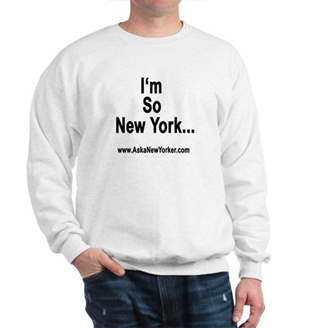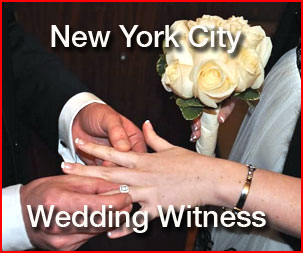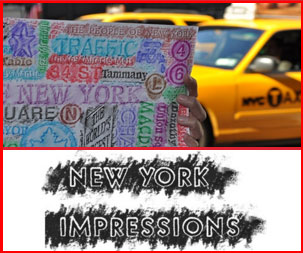Kimmy has just recently moved back to NYC, after spending several months in Buenos Aires, Argentina.
Ask a New Yorker: I’m fascinated with your recent travels. Tell us a bit about this cultural experience.
Kimmy: Well, last January I moved to Buenos Aires. My boyfriend was offered a job there, which was a very interesting situation.
Ask a New Yorker: What was so interesting about it?
Kimmy: Well, it was the first time there for me, personally. I had never traveled internationally before, and so I never really experienced first hand what the rest of the world feels about America. And ironically, my boyfriend was working for a company called Idealist.org, which actually pursues humanitarian efforts and is a website, a meeting place for organizations of non-profits. So everything seemed really great and we had high hopes when we went down there but I guess I didn’t understand the impact of the 2000 collapse of their economy and just what the disparity between the wealthy and the poor actually was.
Ask a New Yorker: So how did this disparity effect you and what did you learn from it?
Kimmy: In terms of the United States, there is a difference between the rich and the poor, but it is not as vast as it is down in Buenos Aires and these third world countries. For example here, if you are on the poverty line, you’re still wearing the North Face down jacket. You’re still Nike-clad and you got the designer jeans and most people have cable and almost everyone has a TV. Whereas down there, merely wearing a pair of Nikes sets you apart from 40%, 50% , 60% of the population where they can’t even fathom owning a pair of Nikes. So while ten cents there means everything to someone, ten cents here, if you give it to someone, they would most likely throw back at you and think it’s insulting.
Ask a New Yorker: Tell us more about these differences.
Kimmy: I think the whole time we were down there, it was something we were certainly aware of, with the dollar being strong against the pesos. You get three pesos to the dollar. So Americans and Europeans (not a lot of Asian people) went there with the idea that they were going to live like kings. And they were going to be the cultural center. So the locals would be so impressed with them because they were world travelers and things of that nature. However it’s kind of the contrary. I found people were a little bit resentful. Just as a lower income neighborhood gets gentrified and those individuals that have spent a lifetime there are being pushed out by higher rents. This is what is happening to their entire country. So while we were able to dine just ostentatiously with wonderful wines and famous Argentinean steaks there certainly was the down side which was a lot of envy which led to violence.
Ask a New Yorker: Violence?
Kimmy: Well on the surface, Buenos Aires is a really cosmopolitan city despite the automobile exhaust and dilapidated cars and things of that nature. You would really never guess that it would be riddled with such petty crime, and like I said earlier, violence. One of the experiences we had was at our very nice apartment in the wealthiest, touristy, old-money neighborhood of Retoleta, where I heard two shots. Now at first, I thought these were from a car back-firing, but I looked out the window and everybody was rubber-necking. So I went down and right outside my door was a man dying in his own pool of blood having been shot most likely by the corrupt police, although the newspaper had quoted that he had committed suicide. These are just things that we were normally used to seeing on TV and perhaps have desensitized us. But when you see it in person it’s almost strangely distant although the image is standing right in front of you.
Ask a New Yorker: I’m listening.
Kimmy: President Bush’s daughter Jenna actually got her purse stolen in San Talmo. The same neighborhood that I had gotten my bag stolen. So it’s not anyone in specific but I think people definitely target Americans. Not that Argentineans folks are bad I just think they’re the by-product of poverty and of the lack of responsibility the government has taken for their well being.
Ask a New Yorker: Now you’re back in NYC. How does that feel?
Kimmy: What actually prompted us to leave is that our apartment was burglarized. It really makes you commiserate because even though I can’t be upset with the person that robbed us of our laptops, cash etc… It gave me an insight to maybe what they have been feeling their entire lives. In coming back to New York in some ways I feel like a coward. I feel like I’ve had such a privileged life. I went down there and I saw people that weren’t so lucky or fortunate. Maybe I just was not prepared because we’ve been sheltered so much.
Ask a New Yorker: Where are we right now?
Kimmy: We’re in Coolhouse. A furniture art gallery. We have contemporary pieces and modern pieces of different furniture that are considered works of art by many.
Ask a New Yorker: Any further insights, thoughts, feelings, desires you would like to share?
Kimmy: I’ll tell you that traveling abroad or living abroad, especially when you don’t speak the language, you really are grateful for the past season reruns of American Idol. And I never thought I would say that.
Ask a New Yorker: Well you did… and we’re grateful for your sharing.


















